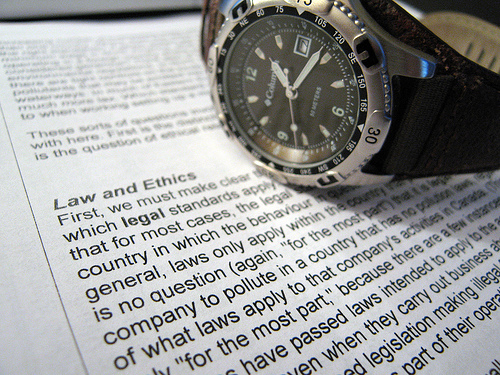Guest Post by Mike Doman
Public relations and ethics have always had an uneasy relationship.
Whether it was PT Barnum’s questionable methods or simply the perception in society that we’re money grubbing, fast-talking glorified salespeople with a casual relationship with the truth, the fact remains that, in many minds, our relationship with ethics is at best, on-again-off-again.
Image: Stephen Wu via Flickr, CC 2.0
As the industry grew, we developed codes of ethics and have widely stuck with them since.
But the advent of the Internet brought along with it many challenges that the generations preceding mine have widely ignored.
It seems that – at least in this part of the world – our industry bodies and their respective codes of ethics are becoming ineffective, if not wholly redundant in many areas.
The area that most requires updating, and desperately so, is unsurprisingly the online world. Most notably: blogs.
Blogs, whether we like it or not, are playing an increasingly large part in the media cycle.
Many command as much respect and weight as traditional media entities.
Yet they aren’t held to the same rigorous standards as traditional media outlets, especially when it comes to the influence of PR on their writings.
For those who have clients in the travel industry, we know that if a journalist is sent as a media representative to a destination, we will undoubtedly see “xx journalist travelled at the expense of yy travel company” in the resulting article.
That’s a given, and allows the general public to see that the journalist might have received some preferential treatment and in many cases, ate and drank like a king without dipping into their own pocket.
But we don’t see it in blogs.
An old friend of mine from university recently did a study on sponsored conversations in social media.
She found that 65 per cent of bloggers said that they had participated in some form of online sponsored conversation.
That’s people like you and I paying them to start a topic or providing them with something for free to test. And on some of these blogs, it’s horrendously obvious that they’ll do anything for a quick buck or for free stuff.
But it’s not such blogs that bother me. What bothers me are the more insidious blogs where the sponsoring is less obvious, and the audience extremely large.
While there is a defence being mounted for sponsored posts, they still suggest disclosure.
The blogosphere has been crying foul at traditional media houses for not recognizing them as a valid contributor to public discourse, but many are reluctant to adopt a code of ethics that might reveal them to be just as “evil” as the media houses they claim to buck against.
Our job, especially when it comes to the media, is to inform and be transparent, not to manipulate and spin (regardless of how society might perceive us).
Picking and choosing blogs that don’t explicitly say that they’re paid content is as ethical as an under-the-table deal.
I’m the first one to say that there are ethical shades of grey in every situation, but if the blogs want to play with the big boys of traditional media, surely they should play by the big boys’ rules and disclose when they’re being paid.
This isn’t so much an opinion piece as a discussion-starter. Please let me know what you think; as for me, I think there’s another blog post somewhere in this topic, or perhaps a few hundred…
 Mike Doman is an Account Executive at Mulberry Marketing Communications in Melbourne, Australia. In between media calls and writing press releases, he does the occasional guest lecture for RMIT and has guest-written for Australian publications including The National Times and Crikey.com.au, along with publishing his own (non-PR) blog, Sporadically Pensive. He has also sat on the admissions panel for RMIT’s Bachelor of Communication (Public Relations) and tweets about everything from Masterchef to media relations.
Mike Doman is an Account Executive at Mulberry Marketing Communications in Melbourne, Australia. In between media calls and writing press releases, he does the occasional guest lecture for RMIT and has guest-written for Australian publications including The National Times and Crikey.com.au, along with publishing his own (non-PR) blog, Sporadically Pensive. He has also sat on the admissions panel for RMIT’s Bachelor of Communication (Public Relations) and tweets about everything from Masterchef to media relations.




![[EVENT]: PR Hacks for Small Biz (online)](https://shonaliburke.com/wp-content/uploads/2021/06/FB-Ad-1200x800-01-01-01-Copy-500x383.jpeg)





[…] media ethical. Just as Waxing Unlyrical helped lead the way when some of the issues surrounding sponsored blogging arose, leading the way on social media abuse should foster dialogue that allows for better, more […]
[…] media ethical. Just as Waxing Unlyrical helped lead the way when some of the issues surrounding sponsored blogging arose, leading the way on social media abuse should foster dialogue that allows for better, more […]
I absolutely agree with this post. If bloggers want to be considered legitimate sources of information, they should make sure they adhere to a high standard of transparency and authenticity. You come off as unprofessional, dishonest and cheap when paid endorsements aren’t disclosed. I actually just published a blog on the same subject at http://www.argylesocial.com/blog, so I especially appreciate your timing on this post. Thanks for sparking a discussion on this important topic.
Laura Coggins
http://www.argylesocial.com
@lauracoggins I think that’s a really valid point – the fact is that in the long term it’s detrimental to the overall perception of your writing. It’s all about disclosure!
This is why the FCC had to come out with disclosure rules, all those tales of Izea and astroturfing PR and bloggers writing about destinations in exchange for free vacations. I’m a purist, just disclose. Don’t care if the book was free, the sample was a gift, if they’re paying you to write about their shiny new bobblehead even though you don’t have any expertise on it. You’re entitled to your opinion, as a blogger work hard to earn a living.. just disclose it. It’s when I find out after the fact that your opinion was bought and paid for, that’s what hurts credibility the most. FWIW.
@3HatsComm I’m with you! I don’t have anything against people being paid to write (we all have to make a living after all), but understanding where the biases might lie is important in effective communication…
Don’t know about the ethics in Australia, but it is severely lacking in the U.S. The shootings in AZ of nearly 2 weeks ago point to the FACT that many top journalists do “manipulate and spin.” Far too many have an agenda and disgustingly use tragic events to further those agendas rather than reporting and waiting for the “facts” to come out.
@Cookie I think that there will always be people who use tragedies to their advantage (we’ve seen it with the floods in Queensland, here) but I certainly don’t want to get involved in a traditional media ethics debate! My issue (at the moment, at least!) is with bloggers who hide their biases.
@mikedoman Mike, I agree with a lot you say here. If someone is getting some type of compensation, then that should be disclosed. However, my AZ comment was meant as an example of bias in general in the traditional media not on taking advantage of tragedies in particular. I see bias on a daily basis from the traditional media who are masquerading as reporters rather than commentators. Also, bias isn’t just based on what you report, it is also on what you choose not to report.
I don’t mean to be insulting, but the average person out here has very little faith in traditional media and their ability to keep their own biases out of their reporting. Polls taken overwhelmingly support this statement. Though I am not a blogger, I would imagine that they dismiss this bias arguement because they feel the traditional media is biased and hiding it on a daily basis. Maybe not based on compensation but bias just the same.
@Cookie @mikedoman The entire issue of bias in the media is such an engrossing topic, IMHO. I mean – is there really ANY unbiased media outlet? Because I certainly can’t think of one. So when people support/become fans of a particular media outlet, I don’t think it’s because they find the reporting balanced and impartial; I think it’s because it matches their own biases and, usually, political persuasion.
@3HatsComm – thoughts?
@Shonali @Cookie @mikedoman I’ll go all Watergate and say “follow the money” as the financial, the business and numbers sometimes are harder to twist and spin (statistics an obvious exception). Even that will have bias. I don’t think anything is presented without bias, without agenda but I’m not sure that’s 100% wrong. Not even talking about the stuff with which I agree, but it is important to assert positions, for a healthy give and take, for genuine debate. If everyone walked the middle of the road, sat on the fence, hemmed and hawed, where would that get us? Nowhere… slowly. Gonna repost this over at @ShellyKramer blog too.
My issue is more that these discussions of OPINION are misrepresented as FACT, then twisted and taken out of context; the game rigged by BIAS pitting one “expert” vs. another of lesser debating skill, credibility, etc. But the catch: it’s our fault. If we keep watching, keep reading the bias “news” and don’t seek out other viewpoints, we’re sorta complicit. I’ll admit I am, jaded and skeptical.. so I don’t always read/watch a lot of news, dismissing it as bias from both sides, everyone arguing so they can keep their power (and money). IDK.. maybe we need to call for a blackout: everyone turn OFF ALL the news channels for a day. During sweeps. FWIW.
@3HatsComm @Cookie @mikedoman @ShellyKramer You’ll “go all Watergate.” LOL!
I don’t think the lack of bias is wrong either – like you, I don’t like it when bias is distorted and presented as fact. And you’re right – it IS our fault for buying into it.
A news boycott during sweeps. Boy, wouldn’t that be something?!
@Shonali @Cookie @mikedoman @ShellyKramer Just remember the movie so well, heh. But even that – not subscribing to the status quo, the party line, digging for a different story – that came from some bias right? Not trusting the establishment. And the more I think about, I like the idea of a boycott. But then it’s those of us who are already skeptical, talking about it that will do it. It’s everyone else who takes what they read and hear as fact that needs the wake-up. See, now you go me being all serious when I’d rather make wise (or dumb) cracks. ;-)
I have a disclosure policy on my site and make very sure to alert my readers whenever I have been compensated in any manner for a post, assisted with attending a conference or event.I use the #CL hastag on Twitter to indicate tweets on behalf of a client.
@geekbabe A disclosure policy on your site is a great idea and I’ve seen a lot of bloggers do that. The only reason I don’t have one (yet) on WUL is that I don’t have a ton of affiliations that would warrant their own page/post, LOL. So I try to be very clear in each post, to the point of being repetitive (e.g. last year, when I was president of IABC/DC Metro, anything, I mean ANYTHING I wrote about them said that I was prez. Maybe some people took it as blowing my own horn, but I wanted to be absolutely clear about my position in the organization, even though it was a volunteer one).
Love the #CL idea.
@geekbabe I think that having a disclosure policy is the smartest way to go about it – give everyone the facts and let them judge the writing / information with all of that in mind. Good writing and information will always be consumed, even if there is a bias!
I put a nice, big FTC disclosure in every sponsored post or produict review I do. If I attend a conference or other event that was paid for by sponsor dollars I make every sure to let people know this as well. My site also has a discloser policy that details how I handle promo work,sponsored posts and sidebar ads. On twitter #CL is the hashtag I use to indicate client, also spelled out in my site’s policy.
[…] This post was mentioned on Twitter by Peter Carr. Peter Carr said: Sponsored Blogging: A New-Age Ethical Question | Waxing UnLyrical: If blogs are valid players in the media, shou… http://bit.ly/e6fDA6 […]
That’s a great starter and I can’t disagree with a word.
There’s no excuse on blogs for failing to disclose the commercial sponsor, though it’s harder on Twitter given the space constraints. [blog] or [client] seem to be the preferred syntax for this.
I recommend Dan Gillmor’s Mediactive (freely available from mediactive.com) as a guide to the complex media ecosystem where we’re all producers as well as consumers.
@Richard_Bailey I’ve been using [client] on Twitter as well, for the same reasons of space, Richard. I rarely write about clients on this blog and when I do, I try to make it absolutely clear they are such. Mediactive is a great resource, thanks so much for sharing that. mrdoman maybe that’s something you can use “down under,” at least to start with?
@Shonali @Richard_Bailey mrdoman Just not gonna open the writing about clients can of worms, too many things can go wrong.
@3HatsComm @Shonali @Richard_Bailey Yeah… I might avoid the writing about clients can of worms as well! I’ll give the guide a go and report back!